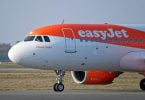LONDON – British Midland Airways Ltd., or bmi, “is here to stay,” the airline’s chief executive said Tuesday, adding there is no intention to break up the carrier.
Wolfgang Prock-Schauer, who took the post as chief executive in November and is tasked with returning the airline to profit, said losses in 2009 would be worse than the pretax loss of £157.3 million in 2008, but a restructuring program would help halve those losses in 2010.
Deutsche Lufthansa AG was a reluctant buyer of bmi last year. It was forced to take control after bmi founder Michael Bishop exercised an option to sell his majority stake to the German airline. The option had been agreed in 1999, but the timing of Mr. Bishop’s decision to sell wasn’t ideal for Lufthansa, which at the time was trying to complete the Austrian Airlines acquisition and introduce its own measures to cope with the economic downturn.
But having attracted interest from some 12 airlines last year, Mr. Prock-Schauer said bmi is no longer in talks about a potential sale. “We are restructuring and that takes a period of time,” Mr. Prock-Schauer said, conceding Lufthansa could decide to sell the airline at some point. A restructured, profitable airline would command a higher price.
Since Mr. Prock-Schauer took charge, the airline has adopted an aggressive restructuring program that will contribute £100 million to annualized savings, but only two-thirds of that amount will be realized in 2010. “There was obviously a problem” with the old bmi model, Mr. Prock-Schauer said, leading to losses when the downturn began.
Bmi’s restructuring involves refocusing its network, reducing capacity by 20% to 25% in 2010, cutting 800 jobs, most of which already have been identified, and returning unwanted leased planes once contracts expire. The program has the backing of unions and employees.
Major factor in the carrier’s speed to restore profitability will be external, such as fuel prices and foreign-exchange-rate movements.
In its 2008 accounts, bmi said it plans to return to profitability by 2012 and that £190 million of additional funding is required by Oct. 31. Lufthansa has provided bmi with two loans, one of which–a £95 million loan–has been secured with slots, Mr. Prock-Schauer said.
Bmi has significant value in its ownership of 10% of the takeoff and landing slots at London’s Heathrow Airport, the world’s busiest international passenger airport. British Airways PLC owns 40% of the slots at Heathrow and previously had voiced interest in bmi because of those assets.
Bmi has leased a number of slots to other members in the Star Alliance and a few to competitors, but those will return to bmi in a year or two and will be used for further expansion if and when the market allows.
Bmi also faces competition from low-cost carriers. Mr. Prock-Schauer wants bmi to retain its budget airline bmibaby, which operates in a market that can still attract customers during downturns. Changes already enacted have meant that bmibaby is as productive with 14 aircraft as it was with 17 due to improved turnaround times.
Following the example of low-cost models, Mr. Prock-Schauer sees opportunities in expanding ancillary revenue across the group by charging for certain services, but he declined to give examples.
He wants bmi to expand routes to the Commonwealth of Independent States, Africa and in Continental Europe by flying into hubs of alliance partners and feeding passengers to other destinations. He also intends to expand services in the Middle East and target the oil and energy community there and in Aberdeen, Scotland, which bmi also serves.






















